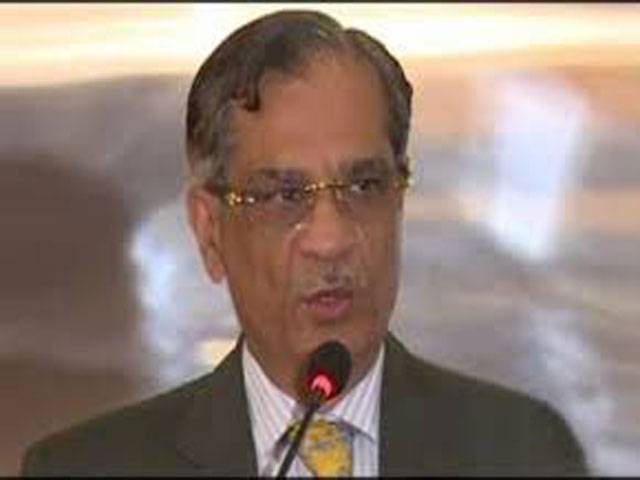LAHORE - Showing serious concerns over supply of water having arsenic concentration, Supreme Court Chief Justice Mian Saqib Nisar Saturday said that he could summon Punjab Chief Minister Shehbaz Sharif over the matter.
“If Sindh CM can appear in the Supreme Court then why not the Punjab Chief Minister?” CJ Nisar asked while hearing suo motu proceedings on supply of unclean and contaminated water to the city at the Supreme Court Lahore registry.
Justice Manzoor Ahmad Malik and Justice Ijazul Ahsan were the other members of the bench. The CJ observed that it was surprising why the government could not decide its priorities so far. Pakistan Council for Research in Water Resources (PCRWR) submitted reports on water supply to the Supreme Court Lahore registry and Lahore High Court.
Examining the report, Justice Ijazul Ahsan observed that it was shocking that unclean water was being supplied to the Supreme Court Lahore registry.
At this, the chief justice came down hard on the Punjab Chief Secretary Zahid Saeed who was present in the court.
“It is my chamber which is getting unclean water and what will be the fate of a common man. The Punjab Chief Minister holds sessions claiming welfare projects for the people and billions of rupees are spent on projects but why the government could not take action for supply of clean water to the citizens? “It is not just water, it is poison which is being supplied to the homes,” the top judge observed. “But I’ll not let it happen. Why don’t you install plants and stop playing with people’s lives,” he said. The chief secretary replied: “According to my information, the water is fine from the source, the connection is also fine; there is problem with the tap from where the samples were taken by the Pakistan Council for Research in Water Resources.” At this, the CJP remarked in local language lagta hai phir hamari tanki he kharab hai that translates ‘it seems then the problem is with our water tank’.
Justice Nisar also asked where the sewerage water was being discharged and whether plants had been established so that the underground water could be safe.
“We are killing people in addition with no health facilities for them,” he said, and asked how many cancer hospitals have been established during the last 10 years.
The chief secretary said that kidney and liver plants had recently been established. At this, the CJ said that everybody knew how these were established and what their standards were.
He directed the top officer to submit reports on water. Water and Sanitation Agency (WASA) also submitted its reports but pleaded for more time for more reports on the water supply. He directed the Punjab government to initiate welfare projects for the public.
Advocate Fahd Malik, member of the commission made on water issue, told the court that PCSIR also submitted its report which was according to the regulations of Punjab Food Authority. The bench observed that they had to determine the regulations.
“International standards must be maintained in providing unclean water to the citizens,” the CJP remarked. During the proceedings, Justice Nisar also said that he had been receiving complaints about closure of various roads in Lahore.
“A colony of retired judges is facing the problem of roads’ closure, some influential person lives there,” he remarked. He asked the officials that who was that to block the roads. “I also fall in the VIP category and a vender sells corns outside my home but I don’t block the roads,” he remarked.
“Panic spreads among the people about unclean water,” he observed. He said: “they will have to set SOPs,”.
Meanwhile, he took notice of the sale of diesel in the city on various food points, with directions to the government authorities to stop the sale of diesel in the markets. “Diesel is death but it is used at various food points,” he surprised. The bench directed the Punjab Chief Secretary and other health authorities to ensure stoppage of diesel use in cooking points. The bench also sought reports about Ajino moto, Tetra pack and Diesel. The hearing adjourned for an indefinite period.






